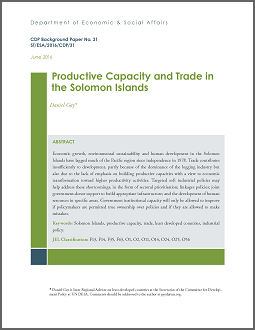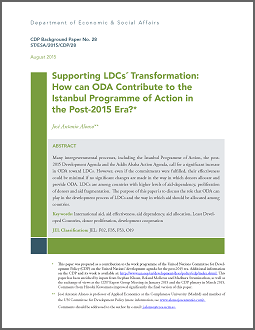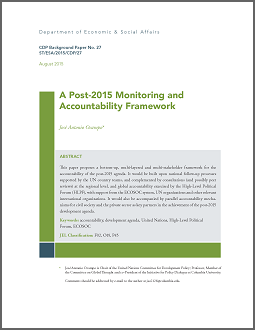Document_CDP: CDP Background Paper series
CDP Background Paper series
30 June 2016
This paper aims to draw insights from New Structural Economics by applying its practical policy tool – the Growth Identification and Facilitation Framework (GIFF) – to least developed countries (LDCs) with a special focus on the case of Uganda.
20 June 2016
Economic growth, environmental sustainability and human development in the Solomon Islands have lagged much of the Pacific region since independence in 1978. Trade contributes insufficiently to development, partly because of the dominance of the logging industry but also due to the lack of emphasis on building productive capacities with a view to economic transformation toward higher productivity activities.
21 April 2016
CDP Background Paper No. 30 By Namsuk Kim and Roland Mollerus Institutional constraints prevent the Least Developed Countries from fully utilizing the trade-related International Support Measures provided by development partners. A cost-benefit analysi ...
12 November 2015
There are significant threats to sustainable food security and nutrition in the long-run, including demographic and environmental pressures and changing business practices in agriculture with the emergence of global values chains. The global nature and public good aspects of the challenges require coordinated responses and urgent improvement of the global governance of food security. This paper argues for the strengthening of the Committee on World Food Security to ensure greater coherence in the global approach to food security and the multilateral trade, financial and environmental regimes.
24 August 2015
Many intergovernmental processes, including the Istanbul Programme of Action, the post-2015 Development Agenda and the Addis Ababa Action Agenda, call for a significant increase in ODA toward LDCs. However, even if the commitments were fulfilled, their effectiveness could be minimal if no significant changes are made in the way in which donors allocate and provide ODA. LDCs are among countries with higher levels of aid-dependency, proliferation of donors and aid fragmentation. The purpose of this paper is to discuss the role that ODA can play in the development process of LDCs and the way in which aid should be allocated among countries.
12 August 2015
CDP Background Paper No. 27 By José Antonio Ocampo This paper proposes a bottom-up, multi-layered and multi-stakeholder framework for the accountability of the post-2015 agenda. It would be built upon national follow-up processes supported by the UN co ...
24 June 2015
The increasing problems associated with international migration call for nations to manage migratory flows in a more realistic way both at national and international levels. However, global initiatives undertaken to date in this field have seen very limited success. This paper adopts a political economy approach for identifying the interests of affected social groups with a view towards building feasible policy responses. A dual proposal for global governance of migration is suggested, based on a combination between the establishment of universal minimum standards and the promotion of bilateral and regional interaction driven by problem-solving goals.
24 June 2015
The success of the post-2015 development agenda depends on adopting global goals for sustainable development and on designing a robust accountability system. All stakeholders should be involved in the accountability framework. While sustainable development goals (SDGs) are universal in character, they need to be adapted to national contexts, according to specific sets of constraints and opportunities. Countries need also to specify their global commitments to create an enabling environment for sustainable development worldwide. The adaptation of global goals into national targets ensures ownership and facilitates answerability, thus promoting an accountability framework that is inclusive, transparent and participatory bottom-up process.
24 December 2014
Recent developments in globalization raise important issues regarding taxation policy and economic development. First, trends in capital income tax raise concerns about a possible race to the bottom or harmful competition. Second, lack of tax policy coordination results in large losses in tax revenue due to profit shifting by multinational corporations. These practices undermine revenue mobilization in the least developed countries, which also suffer from capital flight and other forms of illicit financial flows. This paper discusses how improved governance of the global financial system and enhanced harmonization in taxation policies may help address these important development problems.










Follow Us